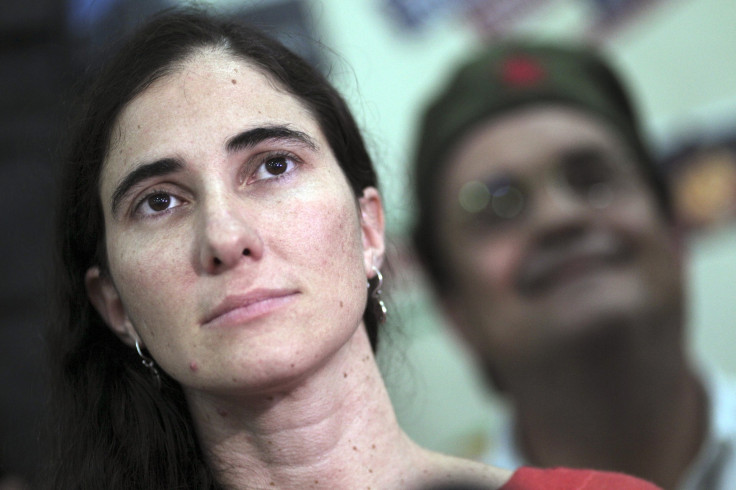Havana's Smear Campaign Against Cuban Blogger Yoani Sanchez Follows Her To Brazil

Cuba’s most prominent dissident Yoani Sanchez has described the ridicule she encountered upon her arrival in Brazil by pro-Fidel Castro leftists as an extension of Havana’s “information war” against her.
Waving Cuban flags, protesters called Sanchez a “mercenary” for the U.S. government and tossed photocopied dollar bills at her as she passed, flanked by her own supporters, through the Guararapes International Airport in northeastern Brazil Monday morning.
“On arrival, many friends welcomed me, and other people shouted insults. I wish in Cuba we could do the same. Long live freedom!” Sanchez wrote in a post on her Twitter account, which has been blocked by the Cuban government for the few Cubans that have access to the Internet.
Later in the evening, more protesters showed up in the city of Bahia to picket the screening of a documentary featuring commentary from Sanchez, titled “Connection Cuba-Honduras,” forcing the event to be canceled.
Sanchez, who was in attendance, attempted to open a dialogue with her detractors but was ignored and shouted over.
“They repeated a hackneyed, identical script without any intention of listening to my response,” Sanchez wrote in her latest blog entry. “They responded to orders. ... I could see the long arm that moves from the Revolution Square in Havana.”
Brazilian magazine Veja first reported that the Cuban government was coordinating a local defamation campaign against Sanchez through its diplomats.
“The plan to spy on and embarrass Yoani Sanchez was drafted by the Cuban government but will run with the knowledge and support of the PT [Workers’ Party], the party activists and at least one employee of the presidency,” wrote Veja reporter Robson Bonin.
The presidential employee, Ricardo Martins Poppi, an aide to Gilberto Carvalho, chief minister in President Dilma Rousseff’s cabinet, told Veja he had attended a clandestine meeting on Feb. 6, which covered migration policy and Sanchez’s upcoming trip.
“That doesn’t surprise me; it’s part of an information war,” Sanchez said in her initial response, the Miami Herald reported.
Sanchez, 37, has gained international recognition for her blog, Generation Y, established in 2007, in which she has written about her experiences living in Cuba.
Her writing, which has been critical of the Cuban government at times, has gotten her blacklisted.
Her blog has been blocked, and she is only able to publish it through the covert help of supporters who can transfer her entries from her portable hard drive onto the Internet.
In the past five years, she has been denied an exit visa to leave the country more than 20 times until the travel restriction was universally lifted last month.
Sanchez has also reported multiple instances of harassment, intimidation and physical abuse from Cuban police and Castro supporters, though she has never been arrested.
One of Sanchez’s supporters, Sebastian Arcos, a Cuban exile and associate director of development at the School of International and Public Affairs at Florida International University, said the Cuban government is threatened by her, because she was born and raised in Cuba and is a product of the education system and, therefore, her criticisms are rooted in the genuine experiences of a Cuban citizen.
Aside from two years Sanchez spent studying in Switzerland from 2002 to 2004, she has spent the rest of her life in Cuba.
“They see her as an internal threat, and she has been able to disarm them by engaging them in a civilized way,” Arcos said. “There is nothing more dangerous to a totalitarian regime than a well-educated, articulate and civilized opponent."
Arcos added that Sanchez is considered even more threatening, because her writing is not overtly political.
“She is not an active member of any dissident movement,” he said. “She is a human being, and she has political opinions, but her primary goal is free expression in its purest form.”
Sanchez has embarked on a three-month world tour, making her first stop in Brazil among roughly a dozen countries, including the U.S., Mexico and Spain.
© Copyright IBTimes 2025. All rights reserved.





















